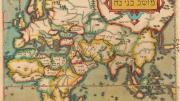Hugh Broughton (1549-1612), an English theologian and Hebraist, brought out his first book, A Concent of Scripture, in 1588. “Concent” means “harmony,” and Broughton laid out what he claimed was a correct chronology of biblical events, harmonizing jarring passages in the Bible itself. The reaction of fellow scholars was not harmonious.
Born in Shropshire, Broughton studied at Cambridge, became a fellow of St. John’s College and then of Christ’s, and took holy orders. Moving to London, he gained powerful friends and the enmity of the Archbishop of Canterbury for his preaching of Puritan doctrine. His Concent was attacked publicly by scholars at both Cambridge and Oxford, and Broughton gave weekly lectures to defend himself. Soon he left England for the continent, where he traveled for many years disputing about his chronology with Jewish, Catholic, and Protestant theologians.
The map above shows the abodes of the children of Noah and their descendants as listed in Genesis 10, with Shem getting Asia, Ham given Africa, and Japheth sent to Europe. It is tipped in to a copy of Concent at the Divinity School’s Andover-Harvard Theological Library. It was probably not part of the book as published, but may have come from a Broughton tract of 1606 published in Amsterdam, which contained the map, uncolored. It appears to be based on a 1597 map by Broughton’s friend Jodocus Hondius, one of the first uses of a Mercator projection.
This copy of Concent was owned by physician Edward Augustus Holyoke, A.B. 1746, LL.D. 1815, son of Edward, A.B. 1705, president of Harvard; E.A. wrote on the flyleaf that he supposed it had belonged to his great-grandfather Edward, who migrated from England in 1636-37. “The Dispersal of the Children of Noah” map is part of an exhibit of biblical treasures, prepared by Clifford Wunderlich, head of public services at the library, and on-line at www.hds.harvard.edu/library/exhibits/online/bible/index.html.
The very learned Mr. Broughton was dismayed when King James did not appoint him to help with the new translation of the Bible, and he attacked the finished product. Dramatist Ben Jonson satirized him in The Alchemist, where the whore Dol Common poses as a gentlewoman driven mad by studying Broughton’s works. But it is said that even his opponents held him in great esteem.









